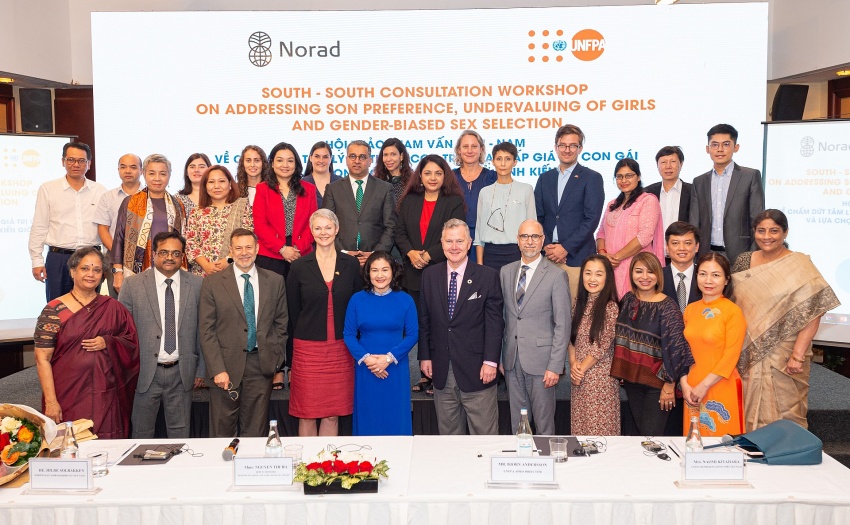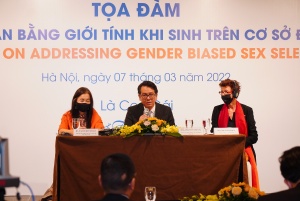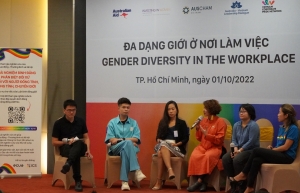Promoting gender equality considered key to ending son preference
 |
| Participants at the global workshop on October 4 in Hanoi |
In an effort to foster concerted action to address son preference and gender-biased sex selection, the United Nations Population Fund (UNFPA) organised a policy dialogue with decision-makers, experts, and civil society representatives from eight countries, namely Armenia, Azerbaijan, Bangladesh, China, Georgia, India, Nepal, and Vietnam.
The workshop, taking place in Hanoi on October 4-6, also saw the participation of ambassadors and representatives from Australia, Canada, Norway, and Sweden.
In several countries in Asia, the Balkans and the Caucasus, and Africa, the preference for having a son remains a pervasive form of gender inequality and discrimination, according to the State of World Population Report published by UNFPA in 2020.
Björn Andersson, regional director for UNFPA Asia-Pacific said that son preference and gender-biased sex selection are, first and foremost, an issue of gender inequality and a violation of human rights.
“We must address social norms that diminish the value of girls and women and support national and community efforts which strive to address preference for sons and sex selection. It is encouraging to see many experts and government officials, as well as civil society representatives coming together to share their knowledge and learnings. The gathering also reinforces the importance of south-south collaboration in promoting gender equality and rights, and ending gender-based discrimination and harmful practices,” added Andersson.
Increased maternal deaths, sexual violence, imbalanced sex ratios, and human trafficking are far-reaching harmful and negative impacts on societies based on gender-biased sex selection.
| “Vietnam has issued policies and legal frameworks, as well as many solutions and interventions, to address gender-biased sex selection,” Deputy Minister of Labour, Invalids and Social Affairs Nguyen Thi Ha. |
In Vietnam, gender equality is a cross-cutting issue in all the guidelines of the Party and the state and is part of the country’s socioeconomic development strategy which aims to build Vietnam into a prosperous, democratic, and fair country, thus ensuring national security and sustainable development, said Deputy Minister of Labour, Invalids and Social Affairs Nguyen Thi Ha.
“Vietnam has issued policies and legal frameworks, as well as many solutions and interventions, to address gender-biased sex selection,” confirmed Ha.
Norway gives high priority in its development policies to strengthening and defending global norms against harmful practices and promoting the rights of girls and women. Hilde Solbakken, Norwegian Ambassador to Vietnam said, “We are proud to support UNFPA’s Global Programme to Prevent Son Preference and the Undervaluing of Girls and we are very pleased to work together with the Ministry of Labour, Invalids and Social Affairs and UNFPA in addressing this issue in Vietnam.”
Naomi Kitahara, UNFPA representative in Vietnam said, “We have clearly created a movement by setting up policy and legal frameworks, introducing innovative and communication activities geared towards behavioural change driven by young people and providing integrated services. This is one of the best partnerships I have seen between the government, development partners, civil society organisations, and UNFPA, working together to achieve a common objective in addressing gender-biased sex selection.”
Activities that foster South-South collaboration and shared learning across nations of UNFPA under the financial contributions from the European Union and Norway have supported the development and strengthening of evidence-based national strategies, policies, and programmes to address son preference and gender inequality across Asia and the Caucasus.
 | Addressing gender-biased sex selection in Vietnam Multi-sectoral cooperation among all parties is required to challenge gender stereotypes and address the issue of gender-biased sex selection (GBSS) in the nation. Central to this is to promote gender equality while raising the importance of giving birth to girls and recasting men’s roles in society. |
 | Promoting workplace gender equality and diversity in Vietnam Cooperation between civil society organisations and enterprises in gender equality, diversity and inclusion is expected to promote gender advancement and create a better working environment for the bisexual, gay and transgender community in Vietnam, according to a recent workshop. |
What the stars mean:
★ Poor ★ ★ Promising ★★★ Good ★★★★ Very good ★★★★★ Exceptional
 Tag:
Tag:
Related Contents
Latest News
More News
- Nestlé Vietnam's Lunar New Year campaign reframes how Tet is counted (January 28, 2026 | 11:40)
- Tet event in Japan celebrates success of 14th National Party Congress (January 25, 2026 | 10:04)
- 14th National Party Congress wraps up with success (January 25, 2026 | 09:49)
- Congratulations from VFF Central Committee's int’l partners to 14th National Party Congress (January 25, 2026 | 09:46)
- List of newly-elected members of 14th Political Bureau announced (January 23, 2026 | 16:27)
- 14th Party Central Committee unanimously elects To Lam as General Secretary (January 23, 2026 | 16:22)
- List of members of 14th Party Central Committee announced (January 23, 2026 | 09:12)
- Highlights of fourth working day of 14th National Party Congress (January 23, 2026 | 09:06)
- Press provides timely, accurate coverage of 14th National Party Congress (January 22, 2026 | 09:49)
- Press release on second working day of 14th National Party Congress (January 22, 2026 | 09:19)




























 Mobile Version
Mobile Version